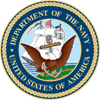|
Navy Fleet AdmiralO-11 Flag Officer, U.S. Navy |
No rank |
Navy Ranks » Fleet Admiral Rank • FADM Pay • FADM Rank History
History of the Navy Fleet Admiral Rank
A Fleet Admiral is a Flag Officer in the United States Navy at DoD paygrade O-11.
The title of "Admiral" is ancient, believed to be a conflation of the Latin word "admirabilis" (admirable) and the Arabic word, "amir al-bahr" (commander of the sea). Many of our military's earliest traditions come from the cross-cultural interactions in the High Middle Ages between Holy Roman and Byzantine Empires. The title has been in use for roughly one millenium.
The rank of "Admiral" did not exist for roughly the first 100 years of the USN because the title tended to remind people of British royalty, so Captain was the highest rank. The need arose to have Fleet Commanders during the Civil War, so various Admirals were appointed. No new Admirals were appointed again until WWI, at which point the positions remained permanent.
Want to learn more? Read about the Navy's Fleet Admiral rank on Military-Ranks.org.
History of the Navy
The Navy traces its heritage back to the Revolutionary War, when Congress funded the construction of several warships to repel the British Empire. Nowadays, much of the Navy's mission is to defend international "freedom of the seas." The Navy considers itself to be more technology-centric than the Army, but more traditional than the Air Force. Surface ships patrol the seas, conducting diplomatic relations with all nations of the world, while also enforcing the law against pirates and drug smugglers. Aircraft Carriers are the most powerful individual assets in America's arsenal, with a single unit being able move and be a major player in an armed conflict. Submarines conduct clandestine intelligence-gathering operations. SEALs are internationally reknown for counter-terrorism and irregular warfare in every possible environment. All Sailors are both warfighters and technical specialists.







































































































































